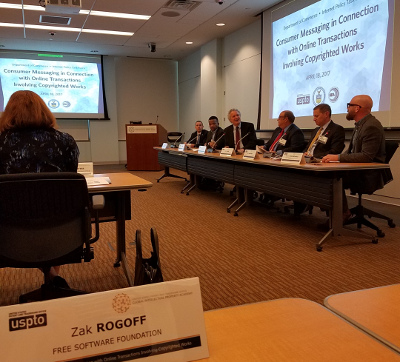
Perzanowski (far right) answers skeptical comments from industry representatives.
When people buy an ebook, do they expect to be able to read it for the rest of their lives? How about the ability to make a backup copy of a movie before their hard drive breaks? For most digital media purchases, these reasonable activities are prevented by DRM (Digital Restrictions Management), but it appears the vast majority of customers don't know it.
This is the key finding of Aaron Perzanowski and Chris Jay Hoofnagle's academic study "What We Buy When We Buy Now," which I watched Perzanowski present last Tuesday at a US Patent and Trademark Office event titled "Consumer Messaging in Connection with Online Transactions Involving Copyrighted Works."
Though we at Defective by Design set our sights on a future without any DRM and urge everyone to buy DRM-free media, we agree with Perzanowski and Hoofnagle that as long as people do buy DRM-encumbered products, they should know what they are getting. That is why we support the Electronic Frontier Foundation's effort to create new US regulations requiring the labeling of products with DRM. Making sure that customers understand their rights before they buy is not a radical notion; it aligns with regulatory precedent, economic theory, and common sense.
But many of the speakers following Perzanowski were not so sure. On panel discussions, lobbyists and lawyers representing publishing, music, and film industry associations unveiled arguments designed to cast doubt on the findings of the study and avoid a conversation about the ways they describe DRM-encumbered media products to customers. Perhaps the most creative argument was that clearly communicating the limits of DRM-encumbered media to customers would make them more confused than burying these details in legal fine print.
Though the media industry representatives were frustrating, their opinion was counterbalanced by a handful of academics and public interest advocates. John Bergmayer of Public Knowledge called for clear, simple, communication of usage rights before money changes hands. His brief talk outlined a variety of methods for communicating rights to customers, including a legal concept known as "various clauses" which would encourage or require media sellers to express rights and restrictions in standardized, discrete terms, similarly to the Creative Commons family of licenses. Representatives of the Department of Commerce's Internet Policy Task Force also nodded towards the possibility of improved labeling practices, though they were reluctant to suggest any government action to bring this about.
Events like this one are not enough to create the change we truly need in digital media markets: massive uptake of free licenses, replacement of proprietary reading and viewing software with free programs, and the total abolishment of DRM. Nevertheless, it is a good sign that a lively debate exists within the halls of the US Patent and Trademark Office. Even if groups like Defective by Design currently have an uphill battle to fight, the free software and free culture movements are as strong as ever, and our activism, entrepreneurship and creativity may yet shift the political winds towards a more just, participatory media future.
Image copyright 2017 Free Software Foundation, licensed under Creative Commons Attribution 4.0.